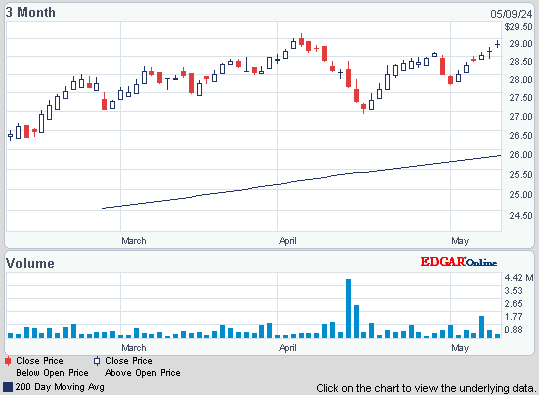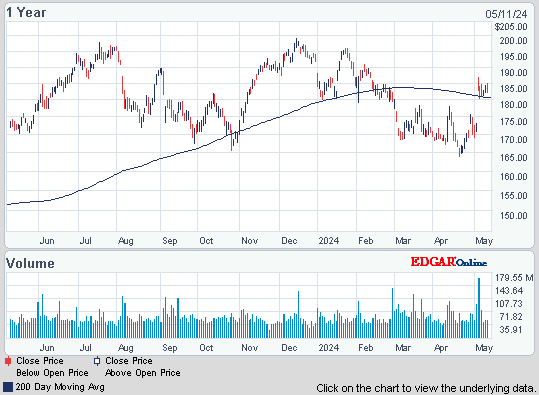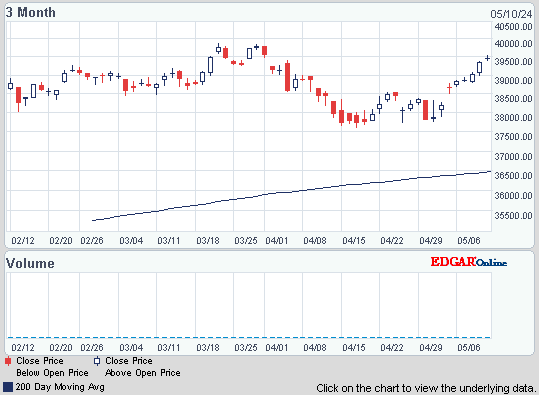Dow jumped 90 (near session highs), advancers over decliners better than 6-1 & NAZ added 33. The Financial Index was up 3+ to the 204s (still 11 below its highs a month ago). The MLP index was up 2+ to 384 & the REIT index gained 2+ to 246. Junk bond funds edged higher while Treasuries retreated, taking the yield on the 10 year Treasury back over 2%. Oil extended gains after the Energy Dept said stockpiles of gasoline & distillate fuels declined. Gold prices hardly budged.


Spanish financial markets were on alert for further disruption, on fears the country might need a bailout. The yield for Spain's 10-year bonds, an indicator of the interest rate a country would have to pay to borrow on intl debt markets, dropped back to 5.81%, still close to the 4-month high of 5.93% reached yesterday (levels that pushed Ireland, Portugal & Greece to seek a bailout). There are several reasons for several concern:
* There are doubts that Spain will be able to lift its stagnating economy out of recession at a time when unemployment is nearly 23%.
*The Spanish gov has to cut its public deficit from 8.5% of its economic output to the maximum level set by the EU of 3% by 2013.
* The country's semiautonomous regional govs have been saddled with high amounts of debt & markets doubt they lack the budgetary discipline to turn their fortunes around.
* Many Spanish banks have been crippled by bad loans following the collapse of the real estate market in 2008. There are fears that the gov will have to step in & inject capital to save them from collapsing.
* Spain makes up 11% of eurozone GDP (compared with 2% for Greece) & would therefore have a greater impact on the eurozone's finances should it seek a bailout.
PM Rajoy said Spain's situation was "difficult and complicated." "The government's economic policies are tough and costly and will not produce results in the short term but they are what we have to do in these moments," said Rajoy. He added that Spain had overspent by €90B ($118B) last year. "We have to ask (creditors) for this and if they don't give it to us it puts us in a difficult position," he said. Adding to the country's woes are intl investors' increasing reluctance to own risky investments, such as gov bonds from Spain & other debt-laden countries like Italy, whose yield on its 10-year bond is 5.5%, down from 5.7% yesterday. Stay tuned for this looming disaster.
Rajoy Says Spain Future at Stake as Debt Crisis Persists

Photo: Bloomberg
The US sued Apple, Macmillan & others, claiming the publishers colluded to fix eBook prices (2 companies have settled their suits). AAPL & Macmillan, which have refused to engage in settlement talks, deny they colluded to raise prices for digital books. They will argue that their pricing agreements enhanced competition in the e-book industry. The Justice Dept is probing how AAPL changed the way publishers charged for e- books on the iPad & a Justice Dept said it would announce an “unspecified” antitrust settlement today. AAPL, Penguin & Macmillan want to protect the agency model that lets publishers, not vendors, set e-book prices. The gov is seeking a settlement that would let Amazon (AMZN) & other retailers return to a wholesale model, where retailers decide what to charge customers. A settlement could also void so-called most-favored nation clauses in AAPL contracts that require book sellers to provide it with the lowest prices they offer competitors. If not settled, this suit could get very messy for AAPL. The stock was not disturbed, gaining 4+ to 633.
U.S. Files Antitrust Lawsuit Against Apple, Hachette


Photo: Bloomberg
The 6 largest US banks are expected to post an 11 % drop in Q1 profits, threatening a rally that has pushed bank stocks 19% higher in 2012. The banks may post $15.3B in net income (after adjusting for one-time items), down from $17.3B in last year’s Q1. Trading revenue at the biggest lenders is projected to fall 23% to $18.3B. US lenders, struggling to expand in commercial banking after the housing collapse, haven’t matched last year’s overall results, even as bond & equity markets strengthened. Making matters worse, loan balances increased less than the economy, bucking a trend in previous recoveries. Loans at the top 25 US banks rose 0.4% in Q1, slowing from 1% growth in Q4, according to the Federal Reserve. Loans fell to $4T from a peak of $4.24T in Q4 2008. Results may disappoint investors who bought bank stocks on a bet the industry was inexpensive & set to benefit from a strengthening economy.
Profit Drop at U.S. Banks Jeopardizes 2012 Share Rally as Loans Trail GDP
Oversold markets rebounded, as bargain hunters returned. Aloca (AA) earnings last night were welcomed by the markets. But earnings estimates for Q1 are for a lackluster qtr & the European debt mess appears too be flaring up again. By the end of the week, the first earnings reports from banks will be out, giving a flavor of what to expect in the coming weeks.

JPMorgan Chase Capital XVI (AMJ)
Treasury yields:
U.S. 3-month | 0.081% | |
U.S. 2-year | 0.298% | |
U.S. 10-year | 2.033% |
| CLK12.NYM | ...Crude Oil May 12... | 101.46 | ... | (0.4%) |
| GCJ12.CMX | ....Gold Apr 12 | .........1,656.10 | ... | (0.2%) |
Get the latest daily market update below:

Photo: Bloomberg
Spanish financial markets were on alert for further disruption, on fears the country might need a bailout. The yield for Spain's 10-year bonds, an indicator of the interest rate a country would have to pay to borrow on intl debt markets, dropped back to 5.81%, still close to the 4-month high of 5.93% reached yesterday (levels that pushed Ireland, Portugal & Greece to seek a bailout). There are several reasons for several concern:
* There are doubts that Spain will be able to lift its stagnating economy out of recession at a time when unemployment is nearly 23%.
*The Spanish gov has to cut its public deficit from 8.5% of its economic output to the maximum level set by the EU of 3% by 2013.
* The country's semiautonomous regional govs have been saddled with high amounts of debt & markets doubt they lack the budgetary discipline to turn their fortunes around.
* Many Spanish banks have been crippled by bad loans following the collapse of the real estate market in 2008. There are fears that the gov will have to step in & inject capital to save them from collapsing.
* Spain makes up 11% of eurozone GDP (compared with 2% for Greece) & would therefore have a greater impact on the eurozone's finances should it seek a bailout.
PM Rajoy said Spain's situation was "difficult and complicated." "The government's economic policies are tough and costly and will not produce results in the short term but they are what we have to do in these moments," said Rajoy. He added that Spain had overspent by €90B ($118B) last year. "We have to ask (creditors) for this and if they don't give it to us it puts us in a difficult position," he said. Adding to the country's woes are intl investors' increasing reluctance to own risky investments, such as gov bonds from Spain & other debt-laden countries like Italy, whose yield on its 10-year bond is 5.5%, down from 5.7% yesterday. Stay tuned for this looming disaster.
Rajoy Says Spain Future at Stake as Debt Crisis Persists

Photo: Bloomberg
The US sued Apple, Macmillan & others, claiming the publishers colluded to fix eBook prices (2 companies have settled their suits). AAPL & Macmillan, which have refused to engage in settlement talks, deny they colluded to raise prices for digital books. They will argue that their pricing agreements enhanced competition in the e-book industry. The Justice Dept is probing how AAPL changed the way publishers charged for e- books on the iPad & a Justice Dept said it would announce an “unspecified” antitrust settlement today. AAPL, Penguin & Macmillan want to protect the agency model that lets publishers, not vendors, set e-book prices. The gov is seeking a settlement that would let Amazon (AMZN) & other retailers return to a wholesale model, where retailers decide what to charge customers. A settlement could also void so-called most-favored nation clauses in AAPL contracts that require book sellers to provide it with the lowest prices they offer competitors. If not settled, this suit could get very messy for AAPL. The stock was not disturbed, gaining 4+ to 633.
U.S. Files Antitrust Lawsuit Against Apple, Hachette
Apple Inc. (AAPL)

The 6 largest US banks are expected to post an 11 % drop in Q1 profits, threatening a rally that has pushed bank stocks 19% higher in 2012. The banks may post $15.3B in net income (after adjusting for one-time items), down from $17.3B in last year’s Q1. Trading revenue at the biggest lenders is projected to fall 23% to $18.3B. US lenders, struggling to expand in commercial banking after the housing collapse, haven’t matched last year’s overall results, even as bond & equity markets strengthened. Making matters worse, loan balances increased less than the economy, bucking a trend in previous recoveries. Loans at the top 25 US banks rose 0.4% in Q1, slowing from 1% growth in Q4, according to the Federal Reserve. Loans fell to $4T from a peak of $4.24T in Q4 2008. Results may disappoint investors who bought bank stocks on a bet the industry was inexpensive & set to benefit from a strengthening economy.
Profit Drop at U.S. Banks Jeopardizes 2012 Share Rally as Loans Trail GDP
Oversold markets rebounded, as bargain hunters returned. Aloca (AA) earnings last night were welcomed by the markets. But earnings estimates for Q1 are for a lackluster qtr & the European debt mess appears too be flaring up again. By the end of the week, the first earnings reports from banks will be out, giving a flavor of what to expect in the coming weeks.
Dow Industrials
Get your favorite symbols' Trend Analysis TODAY!


1 comment:
Alcoa's earnings better be up because their raw material prices are going through the roof. I should probably become a shareholder.
My company purchases a lot our raw materials from them for our Aluminum Floating Docks and we are doing everything we can not to pass on the higher costs to our customers.
Post a Comment